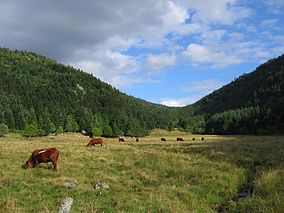Livradois-Forez Regional Natural Park
Livradois-Forez Regional Natural Park (French: Parc naturel régional Livradois-Forez) is a regional natural park located on three French department : Puy-de-Dôme, Haute-Loire and Loire. The two biggest urban areas are Thiers (19,000 inhabitants) and Ambert (11,000 inhabitants). Courpière, Billom and Vic-le-Comte have a secondary place in the territory.
| Livradois-Forez Regional Natural Park | |
|---|---|
 Glacial valley of the Fossat | |
 | |
| Location | Puy-de-Dôme, Haute-Loire, Loire Auvergne-Rhône-Alpes France |
| Coordinates | 45°36′11″N 3°33′00″E / 45.603°N 3.55°E |
| Established | 1986 |
| Governing body | Fédération des parcs naturels régionaux de France |
| Website | http://www.parc-livradois-forez.org/ |
Presentation
editThe park is managed by several structures on a cooperation basis. There is the Auvergne-Rhône-Alpes region, Puy-de-Dôme, Haute-Loire and Loire's departments, by 24 EPCI (French: Établissements publics de coopération intercommunale, which are Public institutions of intercommunal cooperation) and also by 164 towns certified parc naturel régional (Regional natural park). Since March 2008, Tony Bernard, Châteldon's mayor, presides the park. The certified zone of the park covers an area of 311,035 hectares.[1] Its population is of 103 948 inhabitants.[1]
History and creation of the park
edit- Under the presidence[clarification needed] of Maurice Adevah-Pœuf, Thier's mayor and deputy of Puy-de-Dôme, an association for the creation of the Livradois-Forez Regional Natural Park is established in April 1982 at the suggestion of seventeen elected reunited 29 November 1981 in Brugeron.
- In 1984 is created the management mixed union of the Livradois-Forez Park.
- The environment ministry assigned its label in December 1985.
- The Livradois-Forez Regional Natural Park was created on 4 February 1986 by deliberation of the Auvergne regional council.
- Its constitutive charter was re-examined two times, so the label was assigned again in 1998 ; an extension decree of the Regional Natural Park for the next twelve years was published in Journal Officiel (French government website) on 27 July 2011.[2] On the occasion of this latest review, five municipalities of Loire's department joined for the first time the park : Noirétable, La Chamba, La Chambonie, Jeansagnière et Lérigneux.
Its headquarters, originally in Thiers, is now located in the municipality named Saint-Gervais-sous-Meymont.
Geography
editLocated between the old Auvergne and Rhône-Alpes regions, the park extends 110 km from north to south, in three departments (Puy-de-Dôme, Allier and Haute-Loire). It's composed of 176 municipalities gathering 103,172 inhabitants in 2014.[1]
The highest point of the park (1634 m) corresponds to the highest point of the Forez mountains and is located at Pierre-sur-Haute, within the territory of the municipality of Job, in the Puy-de-Dôme department.[3]
Some big geographic zones:
- the valley of factories in Thiers's municipality (in the North of the park);
- the valley of the Dore, which constitutes a sort of backbone of the park;
- the mountains of the Forez with upland plateaus covered with highland moors called Hautes Chaumes;
- Craponne's plateau;
- the countries cut off from Livradois;
- Livradois's mountains, including the high forest plateaus;
- hills and hillsides of the county around Vic-le-Comte and Billom's region
Demography
edit| commune | number of inhabitants |
|---|---|
| Thiers | 11 805 |
| Ambert | 6 743 |
| Vic-le-Comte (commune associée) | 5 027 |
| Billom | 4 745 |
| Courpière | 4 234 |
| Puy-Guillaume | 2 704 |
| Peschadoires | 2 120 |
| La Monnerie-le-Montel | 1 772 |
| Saint-Rémy-sur-Durolle | 1 757 |
| Celles-sur-Durolle | 1 749 |
| Noirétable | 1 611 |
The park is constituted of two major cities, Thiers and Ambert. There are other urban areas but less important. The majority of the biggest cities in the park tend to see its population decrease. Meanwhile, Thiers the biggest city of the park, increase.[4]
Fauna
editWe can find various raptors in the Livradois-Forez regional natural park :[5] pigeons, hawk, circaete Jean-le-Blanc, red kite, buzzard, harrier Saint-Martin, gray buzzard, tengmalm owl, little owl, etc. The Black woodpecker and the Ring ouzel can also be seen in the park.
Publications
editApart from its punctual participation as a supporter, editor of numerous books (historics, etc.) published by various editors of the region, the Park released a twice yearly 8 page magazine, Journal du Parc naturel régional Livradois-Forez, which contents are linked to the environment protection, social life, traditions and culture.
Films shot in the Livradois-Forez Regional Natural
editBefore the creation of the parc
edit- 1965 : Les Copains a French film directed by Yves Robert
- 1976 : L'argent de poche a French film directed by François Truffaut in Thiers
Since the creation of the parc
edit- 1990 : Uranus a French film directed by Claude Berri
- 1993 : Le Chasseur de la Nuit a French film directed by Jacques Renard
- 1995 : Le Garçu a French film directed by Maurice Pialat
- 2002 : Être et avoir a French documentary directed by Nicolas Philibert
- 2004 : Les Choristes a French film directed by Christophe Barratier
- 2007 : Le Piano oublié a French film directed by Henri Helman
See also
editNotes and references
edit- ^ a b c Bilan 2017 - parc naturel régional Livradois-Forez - juin 2018 (in French)
- ^ Décret n° 2011-874 du 25 juillet 2011 portant classement du parc naturel régional du Livradois-Forez (régions Auvergne et Rhône-Alpes) (in French), 25 July 2011
- ^ IGN 2732 E.
- ^ INSEE (2017). "Population légale du Puy-De-Dôme" (PDF) (in French).
- ^ Parc naturel régional Livradois-Forez, carte touristique et patrimoine & circuits de découverte
External links
edit- Site officiel du parc naturel régional Livradois-Forez
- Association in Fayet-Ronaye organizing village festivals, garage sales and publishing a local newspaper "Vivre à Fayet-Ronaye"